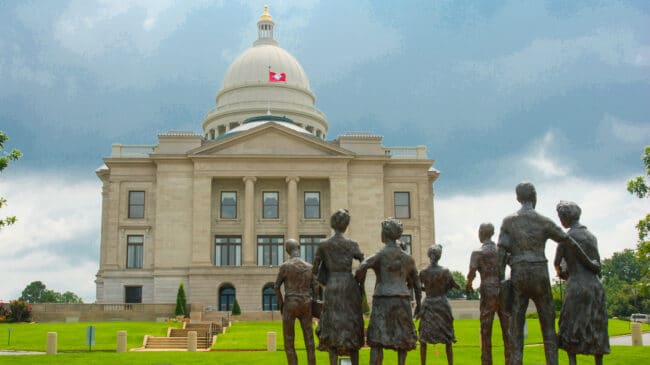For too long, Arkansas students’ public school options have been limited by residential assignment. This outdated and unfair method of school assignment sorts students into schools based on the geographic location of their homes.
This means that access to better public education options can depend on a family’s ability to essentially “buy” seats to better public schools through their mortgage inside the right school district boundaries.
However, a new Arkansas proposal aims to level the playing field, letting families pick their schools— public or private —regardless of their income. Introduced by State Sen. Breanne Davis, the LEARNS Act (Senate Bill 294), has already garnered the support of a supermajority in the Senate. The proposal also has 55 cosponsors in the state House and is strongly supported by Gov. Sarah Huckabee-Sanders.
This proposal would provide universal school choice for all Arkansas families by 2026. Children with disabilities, in foster care, homeless, and those assigned to failing schools would first gain access to an Education Freedom Account (EFA). But all children in the state would be eligible for an account within three years. Families could use their EFA to pay for approved education expenses, such as private school tuition, fees, school uniforms, and supplies.
In addition to private school choice, the proposal would vastly expand the Arkansas Opportunity Public School Choice Act–the state’s cross-district open enrollment program. Cross-district open enrollment lets students transfer to public schools in school districts outside their assigned one.
While all public school districts are required to participate in cross-district open enrollment, the policy is crippled because program participation is capped at 3% per school district. This means very few students can transfer through cross-district open enrollment.
Caps on participation help school districts retain their monopoly over the students that are geographically assigned to them. This means that school districts have little incentive to compete for new students or address the concerns of the students and parents assigned to their schools.
The LEARNS Act, however, would eliminate these arbitrary participation requirements. This reform would make Arkansas the 10th state to adopt a robust mandatory cross-district open enrollment law and the 12th state to have a law that requires mandatory open enrollment.
Any student could transfer to a public school outside their assigned school district. Moreover, students could transfer to their new public school for free, as they should be able to, since Arkansas is one of the 24 states that explicitly prohibits public schools from charging tuition to non-resident students.
Cross-district open enrollment is an essential form of school choice since it often lets students access better schooling options. For example, research from Texas and California found that students often transfer to schools with better test scores or more highly ranked than their assigned schools.
Moreover, in 2016 and 2021, California’s nonpartisan Legislative Analyst’s Office found that students used the state’s cross-district option to transfer to schools that offered Advanced Placement or International Baccalaureate courses, specific instructional models, or emphasized career preparation in particular fields.
Similarly, research on Ohio’s open enrollment program showed achievement benefits. It increased on-time graduation rates for transfer students who consistently used open enrollment, particularly those in high-poverty urban areas.
Open enrollment is a popular choice among families. For instance, participation in Wisconsin’s mandatory cross-district open enrollment program increased from 2,500 students during the 1997-98 school year to 70,000 students 23 years later.
If signed into law, Arkansas’ refurbished open enrollment program would be a noteworthy example of a good education policy that lets students attend schools that are the right fit for them. The LEARNS Act could also weaken public schools’ unfair monopoly over students and encourage competition between schools. Significantly, families’ school choices would no longer depend on where they can afford to live, and instead, parents and students could choose the best schools for them.

